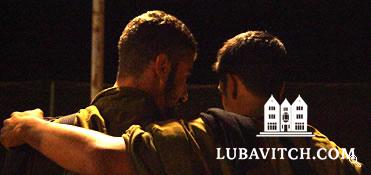You don’t get very far in Israel without coming across a marker of a soldier who gave his life in defense of the land, of its people. So much of Israel is hallowed ground; I tread upon its worn stones and walk its hilly neighborhoods, conscious with every step, of the price exacted so that I may have the privilege.
150 soldiers have lost their lives in this one month battle for Israel’s survival. Just two days before the cease fire, the IDF suffered its worst losses in Lebanon. The news was brutal early Sunday morning with reports of 24 soldiers killed in Lebanon.
I called a friend whose son and son in law were in Lebanon. Her son is fine, she told me. She spoke to him the night before.
She hadn’t turned the morning news on yet. She did not know about the 24.
Several hours later, the IDF delivered the news in person to the mothers. Then the army released the names of the dead. Corporal Yaar Ben-Giat, 19; First-Sgt. Tzachi Kripas, 20, Sgt. Yosef Abitbul, 19; Sgt. Yaniv Temerson, 21; Sgt. Yehonatan Ankonina, 21; First-Sgt. Itai Steinberger, 21; Corporal Tomer ‘Aamar, 19, and more. Another seven the following day …Their photos flashed on the screen, beautiful faces each of them, made even more beautiful by their heroism.
In every war, soldiers die. In Israel, even the young ones went knowing the high probability of death. The high casualties were established as soon as the infantry went into Lebanon. Still, as the fighting grew more intense and more dangerous, many who were exempt for various reasons signed waivers to allow them to serve. “I know I may not make it out alive,” one soldier told me before he left. “But I need to do this.”
I am still trying to take it in when a friend asks if I would accompany her on a shiva call. The country is now, on the surface at least, back to life as always (if such a thing is possible in Israel), but for those mothers and fathers, those sons and wives of the men who didn’t come home.
Visitors stream quietly into Jerusalem apartment of the Meyersons. I do not know them, but I understand that it’s ok for me to be there. Noam Meyerson, 23, a paratrooper, was killed, his mother Gila tells us, only six hours after he arrived in Lebanon. He was studying at a yeshiva in Eilat when the tzav shmona, the “Order 8” call came for him. On Sunday, he came home, packed his stuff, and said goodbye to Gila as she drove him to the drop-off point in Jerusalem. Early Monday morning, the armored vehicle he was in was hit by anti-tank missile.
Noam’s friends have come. They console one another. Gila’s face lights up at the sight of one of her son’s longtime buddies, now in uniform. He lays his rifle on the floor, and pulls a chair over to talk to her about Noam. He tells her about their shared mischief. She wants to hear more.
They laugh, Gila laughs heartily. For a few minutes, Noam is in the room with his mother.
Then she asks the young soldier about his plans. “I have to report up north tonight,” Noam’s friend says.
Gila’s complexion changes. Brows furrowed, painful creases form on her clear face as she looks down, one hand kneading the other in restless motion. She is very quiet; for a few minutes, Gila is alone in her private hell. Maybe she is thinking of her son’s last moments in the burning tank. Maybe she is thinking of his wedding. Noam was to be married on September 12.
Gila looks up at the young soldier with pleading eyes. “Shmor al atzmecha,” she says. That’s Hebrew for “take care of yourself.” He nods. But this mother is not satisfied.
She presses her point. “B’emet.” “Really,” she insists. “Shmor al atzmecha.”

Be the first to write a comment.